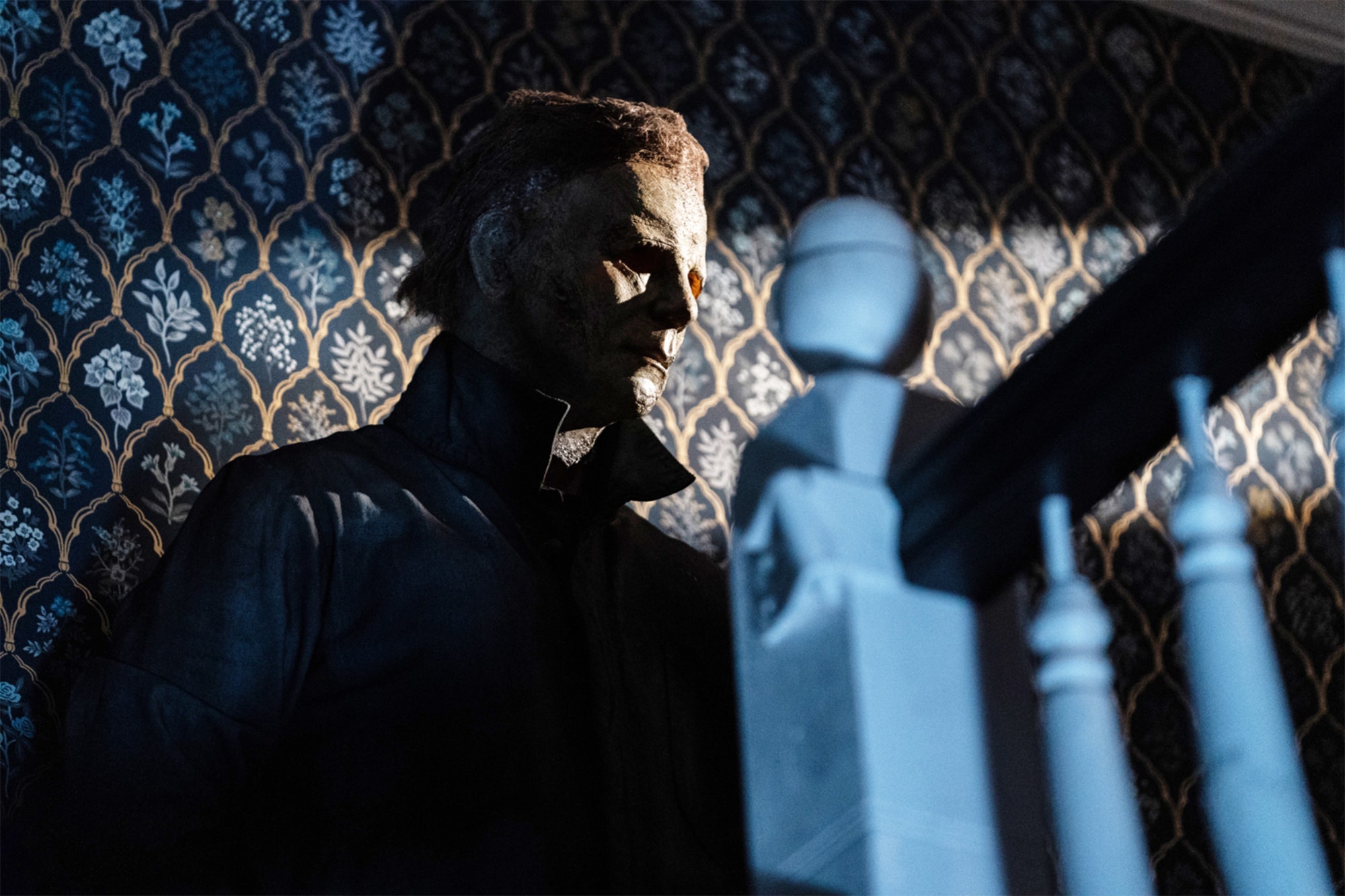Help keep The Curb independent by joining our Patreon.
And here we are again. One year on from Halloween Kills and now apparently the iconic franchise, which has seen four timelines, two reboots, a whole separate anthology film, and 40 years of absurd ideas endlessly thrown at Michael Myers and Laurie Strode, is coming to an end. This is it. This is the end.
Or is it?
No. It’s the end. As definitive as you could ever ask but not how one might expect.
Halloween Ends takes a departure from practically all the other Halloween films and dedicates most of its runtime not towards Myers, but towards a kind of offspring of his evil that still infests Haddonfield, Illinois, 3 years on from the events of 2018’s Halloween and 2021’s Halloween Kills.
Laurie (Jamie Lee Curtis) and Allyson Strode (Andi Matichak) are still here, finally moving on from the terror and trauma brought on by Michael Myers as they and indeed the rest of Haddonfield believe him to either be dead or practically non-existent. But his evil finds its way into the soul of Corey Cunningham (Rohan Campbell), a young man accused of the murder of a boy he was babysitting the night of Michael Myers’ returning rampage, and at the film’s core we have an interesting depiction of what happens when fear and evil, though known and existing, is forgotten about and left to fester. Cunningham becomes a kind of copycat killer due to others believing him to be a child murdering monster (the death was accidental) so much so that they instead create the monster all over again.
I say that this story at it’s core is interesting, but there is still a whole movie around this that director and co-writer David Gordon Green and co-writers Danny McBride, Paul Brad Logan, and Chris Bernier have to execute, and in that regard, this final entry in the Halloween franchise is not the worst of the lot, but it mostly does not work.
None of this comes down to a kind of disappointment Michael Myers is not the focus of the story. After the relentless brutality of Kills at the hands of the character, I am perfectly okay to see something new. What is disappointing is that the “something new” myself and other fans are looking for is now coming at the very end of all things. John Carpenter and Debra Hill never intended Halloween to only be about Michael Myers forever, wanting any sequels to be about different characters and stories related to pagan or urban folklore or mythology, always set around Halloween-time. This was attempted in 1982 with Halloween III: Season of the Witch to mixed results then but has found a cult following today. These new filmmakers of the reboot trilogy have come around and tried to take the anthology concept to heart and explore what it could be like, but it is too little too late.
The film’s plot is a double-helix, twisting together Corey Cunningham’s Christine narrative of obsession with darkness consuming the soul, WITH the conclusion of Laurie Strode and her final battle with Michael Myers. By trying to do both and not one or the other, Halloween Ends drags itself out and wears our attention thin, never giving either story enough logic or justice to warrant the longest runtime in the series.
Michael Myers interrupts Corey Cunningham’s story in the first act, stares into his eyes, a montage flashes up of his guilty past of accidental murder, and somehow Michael can see that and lets Corey go as if there is some telepathic bond? What is this supposed to be? If its metaphorical, then why play the montage? If it’s expressly supernatural, then perhaps that could have been established in the 2018 film or Kills. As for Laurie and Allyson’s story, Allyson falls in love with Corey and wants to run away with him and abandon her grandmother EVEN THOUGH she had only met this man less than a week ago and he is very clearly a sociopath. Laurie keeps going on and on for the whole movie that “Corey is on a dark path” but we never really understand how she knows that beyond a convenient “it’s his eyes” explanation. The whole movie is filled with character and thematic inconsistencies and this was already a frustration of mine with Kills.
The problem is not that the filmmakers don’t understand what makes Halloween great. They have come up with some interesting narrative directions for the established characters and one can find a rich idea of fear connecting all three films in this “reboot timeline”, but it is all in the execution. David Gordon Green opts for overbearing sound design, tight camera angles, assaulting levels of blood and gore, and a screenplay that shouts its themes from the rooftops rather than whisper them to its audience. Even the funnier moments feel like an attack on the senses somehow, and every single scene is spliced together either with an obnoxious noise or nauseating camera movement. He and his fellow writers might know how to write Michael Myers and Laurie Strode, but they have not understood how with simplicity of writing and filmmaking the original film made such an impact as it did.
What is far more annoying is they already knew what they were doing, for the most part, with the 2018 reboot. While the same dialogue and editing issues are apparent there, that film works because it went back to simplistic roots of horror and tension. It had some baffling gore, but built up a story of escalating rage and terror, leading to a showdown that now, two films succeeding it, might as well be treated as the final moment for Michael Myers. It should have been one and done, seeing as barely enough story stretches across both sequels and even the final final conclusion feels like a quick end to something that these filmmakers have been trying to build up as being far more epic.
Laurie and Michael’s “final battle” is contained entirely in a kitchen, is over in under 6 minutes, and ends with the townspeople of Haddonfield dumping Myers’ body into a mechanical shredder where he is crushed to pieces and finally destroyed. It feels all too quick, convenient, and not at all worth such an effort spent undoing the rather perfect ending of that 2018 film.
Halloween Ends does try and be something more than just “Michael Myers kills people AGAIN” but the filmmakers haven’t exactly cracked what that “something else” really is. Jamie Lee Curtis gives it one last go in commendable fashion, but Andi Matichak’s Allyson is given the short end yet again, bumbling from scene to scene with no purpose. Rohan Campbell gives Corey a sullen darkness not easily detectable, and…well they’re practically the only characters, so not much more to go on there. The film’s editing is overly apparent, the cinematography is both bland and intrusive, but John Carpenter, Cody Carpenter and Daniel Davies’ score is always a win. Halloween Kills was bad, and Halloween Ends is mostly mediocre. A forgettable finale that doesn’t prove its reason to exist, filled with baffling choices, some great moments, and an execution leaving much to be desired. If this is the end, so be it.
Director: David Gordon Green
Writers: Paul Brad Logan, Chris Bernier, Danny McBride, David Gordon Green (based on characters created by John Carpenter and Debra Hill)
Starring: Jamie Lee Curtis, Andi Matichak, Rohan Campbell, and James Jude Courtenay as The Shape



